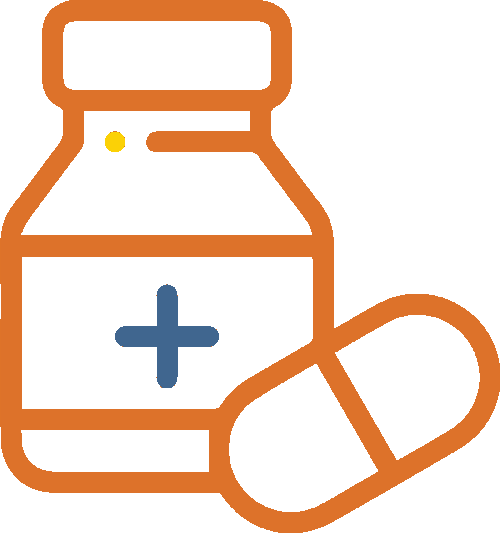Mixing muscle relaxers and alcohol can have serious consequences, including:
- Drowsiness
- Nausea
- Vomiting
- Dizziness
- Blurred vision
- Memory problems
- Problems with coordination
- Slow reflexes
- Difficulty breathing
- Coma
Mixing Muscle Relaxers and Alcohol for Chronic Pain
 Chronic pain is a significant risk factor for substance abuse. People with chronic pain are more likely to develop problems with alcohol and other drugs, including muscle relaxers. So can you drink on muscle relaxers?
Chronic pain is a significant risk factor for substance abuse. People with chronic pain are more likely to develop problems with alcohol and other drugs, including muscle relaxers. So can you drink on muscle relaxers?
Drinking on muscle relaxers is not advised. The combination is dangerous, leading to heightened sedative effects such as dizziness, drowsiness, and impaired coordination. It can worsen chronic pain and should be strictly avoided. Mixing the two can also lead to impaired motor skills and cognitive function, as well as memory problems. In some cases, mixing muscle relaxers and alcohol can even be fatal. Even mixing a muscle relaxer with wine can strain the liver and increase addiction risk. It’s generally advised to avoid this combination or consult a healthcare provider to understand specific risks.
Muscle relaxers are central nervous system depressants. Alcohol is also a central nervous system depressant. Mixing the two can increase the effects of both drugs and lead to serious consequences. 25.8% of people aged 18 years and older report binge drinking in the past 30 days. Every day, 261 Americans die as a result of excessive alcohol use, and 80% of these deaths involve adults aged 35 or older.
In Illinois, 3,391 annual deaths are attributed to excessive alcohol use. 72.3% of deaths are male. 52.4% of deaths are due to chronic causes, such as long-term alcohol abuse. 79.1% of deaths are among those 35 years old or older.
Worldwide, up to 3.3 million people die every year as a result of alcohol abuse. Alcohol-related deaths account for at least 5.3% (some estimate as high as 6.0%) of the world’s deaths. Alcohol causes 13.5% of deaths among 20- to 39-year-olds. Men are three times as likely as women to die as a consequence of alcohol abuse.
If you or your loved one is suffering from alcoholism, dont hesitate. Contact us at Northern Illinois Recovery Center today to know more about our drug and alcohol rehab center.
How Do Muscle Relaxers Impact the Brain?
What are the Withdrawal Symptoms of Muscle Relaxers?
- Anxiety
- Irritability
- Tremors
- Seizures
- Death
What are the Long-term Effects of Muscle Relaxers?
What are the Signs of Someone Abusing Muscle Relaxers?
- They take their medication longer than its needed or prescribed
- They fake back injuries or back pain to get prescriptions
- They go through a prescription quickly and come up with excuses for an early refill (or doctor shopping)
- They spend an extended amount of time thinking about muscle relaxers or plotting how to maintain their supply
- They’re unable to stop using muscle relaxers, even when a problem is pointed out to them
What Are Some Common Examples of Muscle Relaxers?
Carisoprodol, sold under the name Soma, is typically taken orally, and the recommended dose is 250-350 mg three times a day. Mixing carisoprodol with alcohol can cause drowsiness, impaired coordination, and confusion. Soma is classified as a Schedule IV drug (similar to benzodiazepines and Xanax) due to its potential for being abused. Carisoprodol can cause drowsiness and dizziness and isn’t recommended for long-term use or by those with a history of addiction.
Cyclobenzaprine is a muscle relaxer that is used to treat skeletal muscle conditions such as pain or injury. Cyclobenzaprine can cause tachycardia, dry mouth, and drowsiness. Mixing cyclobenzaprine with alcohol can potentiate these effects and lead to impaired coordination, blackouts, and difficulty breathing. If you or someone you know is abusing cyclobenzaprine, it is important to seek help as soon as possible to avoid these potentially fatal consequences.
Chlorzoxazone is a muscle relaxer that is used to treat skeletal muscle conditions such as pain or injury. Chlorzoxazone can cause drowsiness, lightheadedness, and dizziness. Mixing chlorzoxazone with alcohol can potentiate these effects and lead to impaired coordination, blackouts, and difficulty breathing.
Metaxalone is a muscle relaxer that is used to treat skeletal muscle conditions such as pain or injury. Metaxalone can cause drowsiness, lightheadedness, and dizziness. Mixing metaxalone with alcohol can potentiate these effects and lead to impaired coordination, blackouts, and difficulty breathing.
Methocarbamol, which is sold under the brand name Robaxin, is usually prescribed to treat back pain. It’s considered less sedating than other muscle relaxer options.

Mixing Alcohol and Muscle Relaxers
People tend to mix alcohol and other substances for the combined effect of euphoria or disassociation. A person can self-medicate and become addicted if their patterns don’t change. It’s vital to reach out to someone if you feel as though you’re losing your grip. If you must take a muscle relaxer, it is important to avoid drinking alcohol.
Women are 11% more likely than men to be prescribed medication, but men are 22.9% more likely to misuse prescriptions. Both men and women are most likely to use pain relievers, with 32.5% more men than women using—14.4% of adults aged 18 to 25 abuse prescription drugs annually. More than 80 percent of older patients (ages 57 to 85 years) use at least one prescription medication on a daily basis.
Are Professional Athletes at Risk of Mixing Muscle Relaxers and alcohol?
Professional athletes tend to be at higher risk for mixing muscle relaxers and alcohol because of the nature of their jobs. They are often under a lot of physical and mental stress, which can lead them to self-medicate with alcohol or drugs. Alcohol is a central nervous system depressant that slows down the body’s functions. Mixing these two substances can magnify the effects.
Mixing muscle relaxers and alcohol can be especially dangerous for professional athletes because it can increase the risk of injuries, impair their judgment, and slow their reaction time. Those most at risk from mixing muscle relaxers and alcohol are those who take muscle relaxers for long-term pain relief or for conditions such as multiple sclerosis or cerebral palsy.
What Should Someone Do in the Event of an Overdose?
In the event someone you know is overdosing on alcohol and muscle relaxers, it is important to call 911 immediately. Mixing these two substances can cause serious health complications, including coma and death.
What are Treatment Options for Alcohol and Muscle Relaxers?
No matter what type of addiction treatment programs you choose, it is important to remember that recovery is possible. With the right help and support, you can overcome addiction and lead a happy and healthy life. Mixing muscle relaxers and alcohol can be a dangerous combination.
Detoxification is the process of ridding the body of the toxins that have built up from using the substance. This can be done through a variety of methods, including:
- Medically assisted detoxification: This is when a person is given medication to help with the withdrawal process.
- Natural detoxification: This is when a person uses detoxifying foods and supplements to help rid their body of toxins.
- Saunas and steam rooms: These can help to sweat out toxins from the body.
After detoxification, it is important to enter into a rehabilitation program. This can be done through an inpatient or outpatient program. Inpatient programs require a person to stay at a facility for a period of time, while outpatient programs allow a person to live at home while attending.
Inpatient treatment is a higher level of care than outpatient treatment. It is typically recommended for people who have been using alcohol or drugs for a long period of time, or for those who have relapsed after completing an outpatient program.
Outpatient treatment is less intense than inpatient treatment and can be a good option for people who have busy schedules. It can also be a good choice for people who live in areas where there are not many inpatient treatment options available. Outpatient treatment is a form of addiction recovery that allows the person addicted to continue living at home while attending treatment during the week.
Dual diagnosis treatment is a saving grace for those struggling with substance abuse and mental health disorders. Co-occurring disorders are considered a combination of both. It’s important to treat them simultaneously because they influence each other in a recovering person’s journey. Chronic relapse is a common issue for those with co-occurring disorders.
Embrace Change at Northern Illinois Recovery





